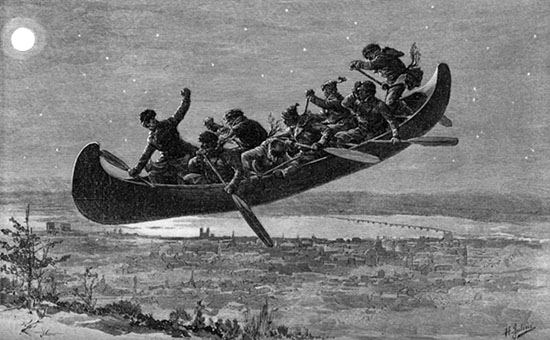Harmony
Today, we look for harmony. The University of Houston's College of Engineering presents this series about the machines that make our civilization run, and the people whose ingenuity created them.
A friend gave me two booklets on Canadian technology. One was about the Voyageurs — 17th and 18th-century traders who moved furs across Canada on great cargo-carrying canoes. A quotation in that book got my attention. It was attributed to a Voyageur:
No portage was too long for me ... My end of the canoe never touched the ground ... Fifty songs a day were nothing to me. I could carry, paddle, walk and sing with any man. ... no water, no weather, ever stopped the paddle or the song.
All that stuff about songs sounded pretty hokey until I remembered Great-Grandpa's account of his journey here in a sailing ship. He traveled in steerage from La Havre to New Orleans in 1843. He complained, not about the wretched food and conditions, but about traveling companions who didn't sing in tune.
So I've been listening to Voyageur songs — simple rhythmic parts songs, sung in tune by untrained voices with lots of open fourths and fifths. Of course these songs were much like the sea shanties of that period. Think about chain gang songs; or even the organum harmonies of the Medieval Church.
The words may vary, but the binding tissue is the same. Harmony unified laborers in their common effort. It turned labor into contemplation. It provided a window into beauty. We have trouble understanding that today. If you or I want the beauty of music, we let someone provide it for us.
I was born into the last gasp of a world where it was still normal to sing around a parlor piano. We all did parts singing in grade school, and everyone knew the basic vocabulary of printed music. We not only sang our own National Anthem at games, we also sang the other verses.
That was fading when I reached Army basic training. Still, I had two barracks mates, Mississippi farmers who, during our morning cleanup, would harmonize old hymns in thirds. They weren't being demonstrative; they were simply continuing a way of life frozen in time, in rural America.
The world has turned since then. Harmony once gave structure to monotony. It focused our inner life when our outer life was hard. Maybe we no longer have that need in our perfect world — perfect images on TV, perfect friends who harmonize without music. Perhaps our perfect illusions squeeze real harmony out.
Lewis and Clark hired Voyageurs for their expedition; they listened to their songs. And, but for one burst appendix, all came back alive. Maybe it's time to acknowledge that our world remains as imperfect as theirs. Musical harmony won't suddenly restore the figurative harmony we all need. But it is a model for human behavior — with value that reaches somewhat beyond mere nostalgia.
I'm John Lienhard, at the University of Houston, where we're interested in the way inventive minds work.
G. L. Nute, The Voyageur. (St. Paul: Minnesota Historical Society, 1955).
The Voyageur quotation is given by: M. Savage, Early Voyageurs: The Incredible Adventures of the Fearless Fur Traders. (Canmore, AB: Altitude Publishing, 2003). (My thanks to Dr. Ali Daneshy for this book.)
In the audio portion of this episode, we've include snippets of Tracks No. and of the recording Canot d'Écorce: Les Fils du Voyageur, sung by the group Heartistry. To listen to more fragments of their Voyageur songs, or to obtain their CDs, go to: http://www.heartistrymusic.com/artists/sov.html
The Bluegrass piece in the audio portion is taken from Angels Rock Me to Sleep, by Bill Monroe and the Blue Grass Boys, Live Recordings 1956-1959, Smithsonian Folkways recordings, 1995, Track 9.

Phantom image of Voyageurs from the 1892 Century Magazine